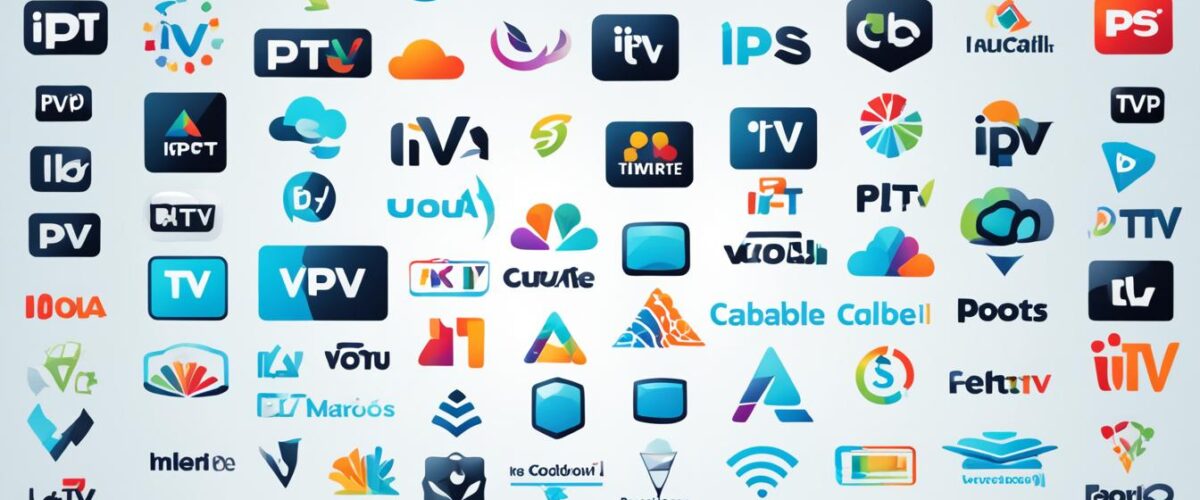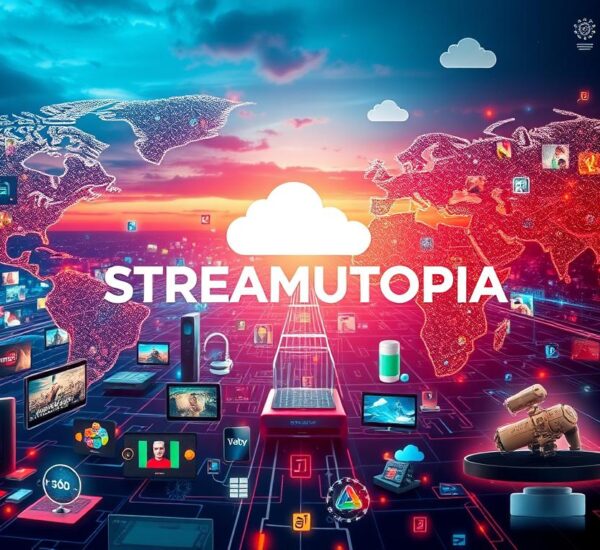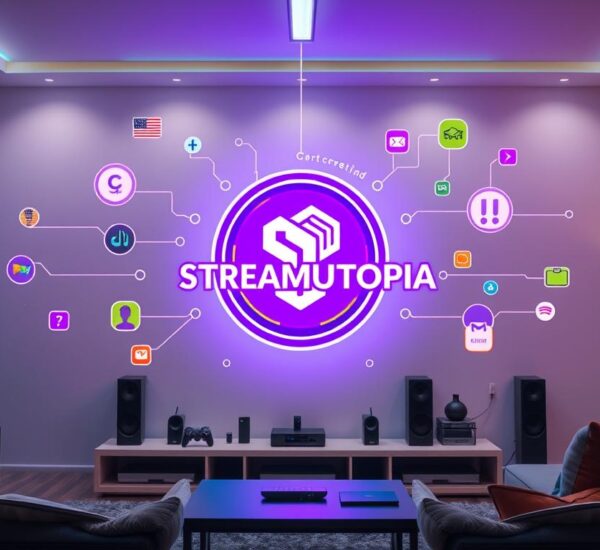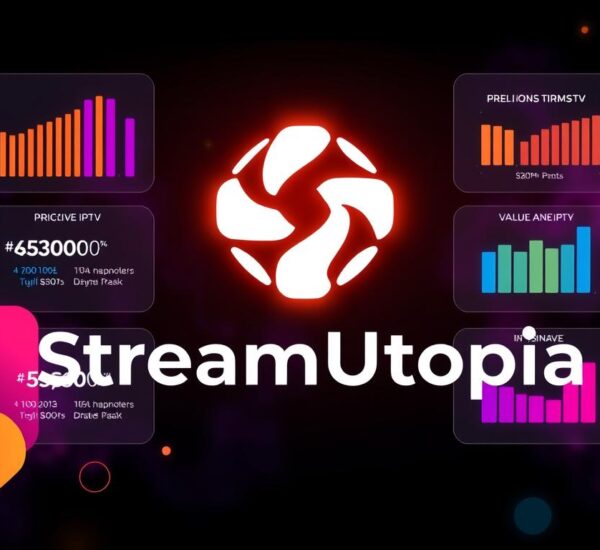What if the way you watch TV is changing, offering more flexibility and options? The battle between IPTV and traditional cable TV is heating up. It’s important to know their pros and cons for modern viewers. This article will look into both platforms, focusing on their unique features and drawbacks. It aims to help you choose the best option for your needs in a crowded market.
IPTV offers a wide range of content, like international channels and on-demand movies. Traditional cable provides a stable connection. Each service has its reasons why viewers might switch or stay with their current provider12>. Let’s dive into these platforms and give you the info to make a choice that fits your viewing habits.
For more on these exciting options, visit Streamutopia. They offer insights into IPTV services that could improve your viewing experience.
Key Takeaways
- IPTV offers a wide range of content, including international channels and on-demand movies.
- Traditional cable provides a stable and reliable connection with consistent service quality.
- Cost structures vary significantly, with IPTV often being perceived as more affordable than cable.
- Understanding the technology and setup differences is crucial when choosing between services.
- Legal considerations are essential when selecting an IPTV provider.
Understanding IPTV
What is IPTV? IPTV stands for Internet Protocol Television. It’s a new way to watch TV over the internet, not through cable or satellite. This lets users enjoy lots of channels and on-demand videos through their internet connection. An IPTV overview shows it offers a better experience with high-definition streaming and quick loading times.
The IPTV benefits include watching content on devices like smart TVs, tablets, and smartphones. People like this because IPTV is flexible and often cheaper than traditional TV. It’s perfect for those who want to save money but still enjoy watching their favorite shows2. IPTV also has cool features like on-demand videos, interactive guides, and cloud-based DVR services, making it more fun and engaging3.
IPTV lets viewers watch TV from anywhere, breaking the limits of cable TV. This new way of watching TV is getting more popular as it keeps getting better. It offers a wide range of content at good prices, making it easy and fun for everyone2.
How IPTV Works
IPTV technology sends TV content over the internet, changing how we watch media. It lets users watch live or on-demand shows through the internet, not traditional cables. This means streaming IPTV often gives better quality images and sound, making watching TV more fun and smooth.
This tech turns video into packets that go over a network. You need a set-top box or app to decode them. IPTV has many formats, like live TV, VOD, and time-shifted TV, for everyone from sports fans to families4. The global IPTV market is expected to grow by 15.1% each year from 2023 to 20324.
IPTV technology is great because it lets you interact with shows on many devices. You can watch on Smart TVs, phones, tablets, and computers. But, it’s important to remember that it can face problems like packet loss and network issues5
IPTV is competitive with traditional TV by offering affordable and flexible plans. You can pick from many IPTV services, like Hulu Live TV, Sling TV, and CBS Sports HQ, each catering to different tastes4. Learning about how IPTV works shows its importance in today’s media world.
What is Traditional Cable TV?
Traditional cable TV uses coaxial or fiber-optic cables to bring TV shows to your home. It has been a reliable source of entertainment for many years. The system sends signals directly to your set-top box, letting you watch a wide range of channels from cable providers.
What is cable TV? It’s a service you pay for that needs a physical setup and connects to a cable network. Cable TV offers different channel packages, like sports, news, movies, and more. It’s great for areas where internet access is poor.
Traditional cable TV is known for its stability and high-quality streaming. This means you won’t face the service disruptions often seen with internet-based services. It’s perfect for watching live events and popular shows in real-time, like sports or news. Plus, you can get internet and phone services bundled with it, making it a cost-effective choice.
| Feature | Traditional Cable TV | IPTV |
|---|---|---|
| Delivery Method | Coaxial/Fiber-Optic Cables | Internet Protocol |
| What is Cable TV? | Physical installation and subscription | No installation required |
| Cable TV Benefits | Reliability, wide channel selection | On-demand, interactive features |
| Service Availability | Limited to geographic areas | Wider availability with internet access |
In summary, traditional cable TV is still a key part of how we watch TV. It offers a dependable and engaging way to enjoy your favorite shows678.
How Cable TV Works
Cable TV uses coaxial or fiber-optic cables to send TV signals to homes and businesses. It starts with content providers sending signals to central hubs called headends. Then, these signals go through local coaxial networks to reach individual subscribers.
To get cable TV, you need a set-top box or a TV with a built-in tuner. You also pay a monthly fee. This fee covers the cost of the infrastructure and setup needed for cable TV9. Unlike IPTV, cable TV needs physical cable lines and equipment9.

IPTV lets you pick your favorite channels, but cable TV usually has fixed plans with different packages and prices9. Cable TV is known for its reliable signal quality, thanks to its established infrastructure10. You’re likely to have fewer interruptions with cable TV compared to IPTV, which can have buffering or quality issues10.
Cable TV systems also offer DVR functions, letting you record live shows to watch later. While IPTV has more advanced features and flexibility, cable TV’s ease and reliability attract many users11.
The Pros and Cons of IPTV vs. Traditional Cable TV
IPTV has many benefits over traditional cable TV. It offers flexibility, a wide range of content, and new features that fit today’s viewing habits. Let’s look at the advantages of IPTV and why it’s a top choice for entertainment today.
Pros of IPTV
Variety of Content
IPTV lets users stream live TV, movies, and videos over the internet12. This means viewers can enjoy a wide range of content and even watch shows from around the world. It’s something traditional cable often can’t match.
Flexibility and Convenience
One big plus of IPTV is watching shows on different devices like TVs, computers, smartphones, and tablets12. This flexibility lets viewers watch their favorite shows anytime, anywhere. It’s perfect for those with busy lives.
Customization Options
With IPTV, viewers can pick their own channel packages12. This means choosing only the channels and features you like. It’s a big change from the set plans of cable providers.
High-Quality Streaming
IPTV is known for its high-quality video with fewer interruptions13. Its dedicated networks make streaming smooth. Viewers can enjoy shows in HD and 4K, making their viewing experience better.
Interactive Features
IPTV comes with cool features like Video on Demand (VoD) and Near Video on Demand (nVoD)12. These let users watch their favorite shows whenever they want. It’s the kind of interaction today’s viewers expect.
Cons of IPTV
IPTV has many benefits, but it also has some downsides. Knowing these IPTV drawbacks is key for those thinking about switching from traditional cable TV. Here are some main points to keep in mind.
Internet Dependency
IPTV needs a strong internet connection to work well. If the internet is slow or unstable, you might face buffering or interruptions. This can make watching TV less enjoyable, especially during busy times online.
Complex Setup Requirements
Setting up IPTV can be tricky and might stop some people from trying it. Unlike traditional cable, which is easy to set up, IPTV requires special equipment and setup. This can be a turn-off for those who want a simple setup.
Service Reliability Issues
IPTV can have problems with reliability. You might find it hard to use with certain devices or have trouble with the service being available all the time. Traditional cable has a reliable setup, but IPTV depends on your internet service, which can be less reliable.
Legal and Licensing Concerns
What you can watch on IPTV can be limited by legal and licensing issues. You might not be able to see some shows or movies because of where you live or legal fights over rights. This can make IPTV less appealing compared to traditional cable.

| IPTV Drawbacks | Description |
|---|---|
| Internet Dependency | Requires a stable internet connection, which can affect viewing quality. |
| Complex Setup Requirements | Installation can be intricate and requires specific hardware. |
| Service Reliability Issues | Vulnerable to issues based on the ISP’s performance. |
| Legal and Licensing Concerns | Limited content availability due to legal restrictions. |
The Cons of Traditional Cable compared to IPTV are many and important to think about when choosing your entertainment. Knowing these points gives a clearer view for those deciding on their TV options148.
Pros of Traditional Cable TV
Traditional Cable TV is a top pick for those who value its dependability and ease. It starts with a steady and reliable connection. This means a smooth viewing experience without any breaks. It’s different from IPTV, which can be affected by internet problems.
Cable TV keeps a strong signal quality. This suits households with different viewing tastes.
Stable and Reliable Connection
Cable TV’s steady performance means less buffering or quality drops. This is a big plus for many viewers. It’s why many choose it over internet-based services.
Ease of Use
Setting up cable TV is easy, making it great for anyone. It doesn’t require a lot of tech knowledge. This ease of use is a big reason why people like it.
Bundled Services Availability
Cable TV often comes with internet and phone services at good prices. This makes it a smart choice for those who want everything in one package. It’s convenient and cost-effective.
Access to Live Sports and Events
Traditional cable TV is great for live sports and events. It has a wide range of channels covering various sports. This is a big draw for sports fans who want to watch their favorite teams and events at home.
Traditional cable TV offers reliability, ease, bundled services, and live sports. These features make it a strong option for families looking for a dependable way to watch TV. It’s still a favorite in many homes, showing its lasting appeal1015.
Cons of Traditional Cable TV
Traditional cable TV has been a mainstay for many homes, but it has its downsides. These drawbacks can lead to dissatisfaction among viewers. The limitations of Cable TV can be frustrating for those seeking more options and flexibility in their viewing.
Limited Content Variety
Cable TV packages often limit viewers to a small number of channels. This can be a letdown for those wanting a broader range of programming. It often misses niche channels and the latest streaming hits, which IPTV offers more easily.
Higher Costs
Cable TV plans can be much pricier than IPTV services. They often come with extra charges for premium channels and equipment rentals. This makes them less budget-friendly for those watching their spending16.
Lack of Flexibility
Cable TV usually forces viewers to watch shows at a set time. This is unlike IPTV, which lets you watch when you want. This inflexibility can clash with today’s viewing habits, where people like to watch at their own pace.
Geographic Limitations
Even though cable TV is widespread, it’s not available everywhere. Rural areas may find it hard to get reliable cable, especially when compared to satellite options that reach farther17.

| Aspect | Traditional Cable TV | IPTV |
|---|---|---|
| Content Variety | Limited selection, often missing niche channels | Wider range, includes a variety of streaming options |
| Cost | Higher pricing, additional fees | Generally more affordable |
| Flexibility | Fixed programming schedule | On-demand viewing available |
| Geographic Limitations | Variable availability, especially in rural areas | Accessible via internet, less affected by geography |
It’s important to know these Cable TV drawbacks when thinking about switching to other viewing options, especially when comparing IPTV and Cable TV17.
Comparing IPTV and Traditional Cable
When looking at IPTV and traditional cable TV, several factors stand out. The main difference is how each delivers content. IPTV uses IP networks for live TV, video on demand, and time-shifted TV, which traditional cable can’t match easily8. Cable TV, on the other hand, is known for its reliable quality, not depending on internet speed15.
IPTV offers on-demand services and catch-up TV, giving viewers more flexibility than cable15. This means you’re not stuck to a set schedule, which is great for today’s busy lives. IPTV also has cheaper and more flexible subscription plans than traditional cable, attracting those watching their budgets9. It supports HD and 4K streaming, but you need a fast, stable internet for the best experience9.
Cable TV, however, has a wide range of channels, including local and premium content, which is key for those who like a traditional TV setup15. Setting up cable can be a hassle, but IPTV only needs an internet connection, making it great for areas without cable9. IPTV also offers cool features like DVR, live TV pausing, and interactive guides that make watching TV more fun8.
In the end, choosing between IPTV and Cable TV depends on what you value most: content, cost, or user experience. By understanding the differences, viewers can pick what fits their lifestyle best.
Cost Comparison
Looking at IPTV vs. Cable TV pricing, the cost is a big factor. IPTV services cost between $25 to $65 a month. Cable TV starts at $50 to $60 for basic plans18. IPTV uses devices like smart TVs or streaming sticks, which are cheap. Cable TV needs set-top boxes that cost extra, adding $5 to $15 or more to your bill18.
Installation costs vary too. Cable TV can cost $50 to $200 to set up, while IPTV usually doesn’t need a professional installer, saving you money18. IPTV also offers month-to-month plans with no cancellation fees. Cable TV often has long contracts and high cancellation fees18.
IPTV includes features like cloud DVR storage and multiple profiles without extra fees, unlike cable TV which charges extra for these18. Cable TV bills can have hidden fees like broadcast TV fees and regional sports fees18. Over three years, IPTV could save you about $2,410 compared to cable TV, considering monthly costs and other expenses18.
The market is moving towards IPTV because it’s cheaper and more flexible, thanks to fast internet19. IPTV doesn’t have the hidden fees that cable TV does, making it more transparent for customers19. People prefer IPTV for its lower cost and better on-demand options19.

Content Variety: IPTV vs. Traditional Cable
When comparing IPTV vs. Cable TV variety, content variety is a key factor. IPTV offers a wide range of channels from around the world, plus on-demand movies and series. This appeals to viewers who want more choices1. IPTV also delivers content in high-definition (HD) and even 4K, giving a better viewing experience than traditional cable1. The growing number of IPTV users shows people like the ability to pick what they watch20.
Traditional cable TV, on the other hand, has a set list of channels with few options to customize. This can lead to viewers feeling limited in their choices1. Cable TV is also more expensive, especially for premium channels and renting equipment, making it less appealing in the content variety comparison1. Cable services are also not available everywhere, making it hard for people in rural areas to get diverse programming1.
IPTV stands out with its wide range of content, affordable prices, and customizable packages. Subscriptions start at just $19.99, making it a budget-friendly option for viewers21. This makes IPTV an attractive choice for those looking for a varied and affordable media experience21.
| Feature | IPTV | Cable TV |
|---|---|---|
| Content Variety | Extensive international channels, on-demand movies, series | Fixed range of channels |
| Quality Options | HD and 4K available | Standard quality |
| Price Flexibility | Customizable packages starting at $19.99 | Potentially higher costs with premium charges |
| Access Limitations | Available via internet globally | Geographically restricted infrastructure |
Viewing Flexibility Between IPTV and Cable TV
The viewing flexibility of IPTV is changing how we watch media. Now, you can watch shows on phones, tablets, and smart TVs, making it super personal. Cable TV, on the other hand, sticks to a set schedule, which can be a problem for those who like watching when they want.
IPTV started to grow as more people got fast internet in the early 2000s. It became a flexible way to watch TV. With services like IPTV Smarters and Xtreme HD IPTV, you can pick a plan that suits you, like monthly or yearly22. In 2020, the IPTV market was worth USD 61.2 billion and is expected to grow even more in Asia Pacific from 2021 to 202823.
IPTV gives you live TV, video on demand, and more, all in a flexible way. This is great news as people spent less on traditional pay-TV in 2020 compared to broadband and IPTV23. IPTV doesn’t stick to a fixed schedule, fitting better with how we like to watch TV, making users happier24.
Quality and Reliability: A Side-by-Side Analysis
When choosing between IPTV and traditional cable, quality and reliability matter a lot. IPTV uses the internet to send content, so its reliability depends on your internet speed and stability. A slow or unstable connection can cause buffering and interruptions, making watching TV less enjoyable. Traditional cable TV, on the other hand, has its own dedicated lines, which means a steady connection. This makes its service more reliable and consistent.
The number of cable and satellite TV users is expected to drop by 26% by 2030. This shows people are moving towards more flexible ways to watch TV, like IPTV25. In 2023, the global OTT Video market is set to hit about US$295.40 billion. This shows IPTV and OTT services are gaining popularity because they’re cheaper and offer more interactive features like Video on Demand25. OTT platforms also use the internet you already have, letting you watch content on many devices. This gives them an edge over traditional cable TV25.
IPTV can offer quality and a reliable streaming experience, sometimes even better than cable if your internet is fast. Fast internet means smoother streaming, making IPTV a better service25. Services like Hulu and YouTube TV also show how different subscription plans can meet various budgets. For example, Hulu starts at $7.99 a month, while YouTube TV costs $72.99 a month with unlimited DVR storage26.
This comparison highlights the differences in consistency between IPTV and traditional cable TV. IPTV offers a personalized and flexible way to watch TV that suits many people’s needs and locations. This makes IPTV a strong competitor to traditional channels25.
| Aspect | IPTV | Cable TV |
|---|---|---|
| Infrastructure | Relies on internet connectivity | Dedicated physical connections |
| Quality | Broadcast-like, subject to internet speed | Generally consistent, less variability |
| Cost | Varies widely depending on the provider | Higher fixed costs |
| Flexibility | Highly flexible, various devices supported | Limited to cable boxes |
| Subscription Options | Many budget-friendly models available | Typically fewer price points |
Interactive Features in IPTV vs. Traditional Cable
Interactive features are key to making TV watching more fun and engaging. IPTV brings new interactive capabilities like DVR options, live TV controls, and personalized guides. These make watching TV more exciting than traditional cable, which mainly offers live shows. Studies show more people now prefer IPTV interactive capabilities, making it more popular27.
IPTV lets you watch on smart TVs, computers, tablets, and smartphones. This means families can watch different shows at the same time. IPTV also offers customizable packages, which can be cheaper than traditional cable28. It works well with smart home tech, making it a hit with those who love modern comforts27.
IPTV stands out with its huge selection of channels and programs from around the world. It has special channels for different interests and a big on-demand library with catch-up TV28. Traditional cable doesn’t offer these cool features, sticking mainly to live shows.
The way we get TV is changing, with IPTV leading the way in tech and content. IPTV services often have amazing HD and 4K quality that meets today’s streaming needs. They also adjust video quality based on your internet speed, making IPTV a top choice for better content29.
Knowing how interactive features affect our TV watching helps us choose what we like best. As IPTV keeps adding more interactive stuff, it’s clear these features make us happier with our TV27.
Conclusion
Choosing between IPTV and cable TV depends on what you like and need. If you want lots of choices, to pick what you watch, and to interact with your TV, IPTV might be better. It has grown popular, with more people using it than satellite TV in Western Europe since 201530. IPTV also offers high-definition (HD) and even 4K streaming31. You can customize your channels to save money32.
On the other hand, cable TV is great for those who like simple, reliable service. It’s perfect for watching live sports and events without worrying about internet issues. Cable TV has stable connections and often comes with other services bundled together.
When deciding, think about how you watch TV and what you need from a service. This way, you’ll pick the best option for you. It’s all about finding the right fit in today’s world of entertainment303231.
FAQ
What is IPTV and how does it differ from traditional cable TV?
What are the key benefits of IPTV?
Are there any major drawbacks to using IPTV?
What advantages does traditional cable TV offer?
How does the content variety compare between IPTV and traditional cable?
Which service tends to be more cost-effective, IPTV or cable TV?
How does viewing flexibility differ between IPTV and traditional cable TV?
What role do interactive features play in the differences between IPTV and traditional cable TV?
How important are quality and reliability when choosing between IPTV and traditional cable?





